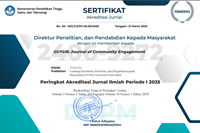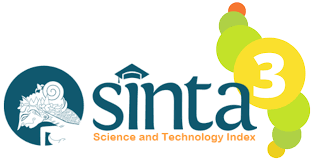PKM Pendampingan Communicative Concept Mapping Proyek Islamisasi Kurikulum Pendidikan di Pesantren Nurul Jadid
(1) * Rojabi Azharghany
 (Universitas Nurul Jadid, Probolinggo)
(Universitas Nurul Jadid, Probolinggo) Indonesia
(2) Shafira Aulia (Universitas Nurul Jadid, Probolinggo)
Indonesia
(3) Shofiatul Meiniah (Universitas Nurul Jadid, Probolinggo)
Indonesia
(4) Mufliha Mufliha (Universitas Nurul Jadid, Probolinggo)
Indonesia
(5) Ulfi Nadiroh (Universitas Nurul Jadid, Probolinggo)
Indonesia
(6) Zahratul Fikri An-Nabila (Universitas Nurul Jadid, Probolinggo)
Indonesia
(*) Corresponding Author
AbstractKegelisahan yang dialami pemegang kebijakan arah pendidikan dalam menentukan profil lulusan santri di Pesantren Nurul Jadid, muncul gagasan untuk melakukan “islamisasi” kurikulum pendidikan. Namun gagasan yang muncul tersebut dimungkinkan kurang akrab dalam pengetahuan guru. Disinilah pentingnya pemetaan pengetahuan dengan harapan dapat menjadi dasar untuk rencana aksi. Langkah awal yang perlu dilakukan adalh dengan membuat jalur Communicative Concept Mapping (pemetaan konsep komunikatif), sebuah metode yang sering digunakan untuk menilai pengetahuan partisipan tentang suatu topik. Proyek saya mempelajari bagaimana pengetahuan guru terkait berpikir reflektif tentang islamisasi pengetahuan dan penilaian mereka terhadap islamisasi pengetahuan yang mereka fahami untuk diterapkan dalam kurikulum selama pengalaman profesional (professional experience) mengajar. Pendampingan ini menghasilkan sudut pandang metodolgis dan praktis Pertama, Masuk ke dalam, jangan lebar . Metode pemetaan konsep ini menghasilkan sejumlah besar data kualitatif untuk digunakan, jadi lihatlah pengetahuan, perubahan pengetahuan, dan penalaran beberapa orang secara mendalam. Ini bukan metode praktis untuk studi skala menengah atau lebih besar. Kedua, Menggabungkan peta konsep dengan wawancara memberikan peluang yang sangat baik untuk triangulasi pernyataan peserta mengenai pemahaman mereka tentang topik tersebut. Ini juga memungkinkan Anda untuk beralih dari pertanyaan tentang apa yang diketahui peserta (sesuai peta konsep mereka) ke pertanyaan menyelidik tentang bagaimana mereka mengetahuinya dengan cara tertentu. |
Keywords
Full Text: PDF
Refbacks
- There are currently no refbacks.
Copyright (c) 2022 Rojabi Azharghany

This work is licensed under a Creative Commons Attribution-ShareAlike 4.0 International License.
This journal is licensed under

Creative Commons Attribution-ShareAlike 4.0 International License.








.png)
